Becoming An Everyday Hero: Neal McCoy & Rodney D. Bullard
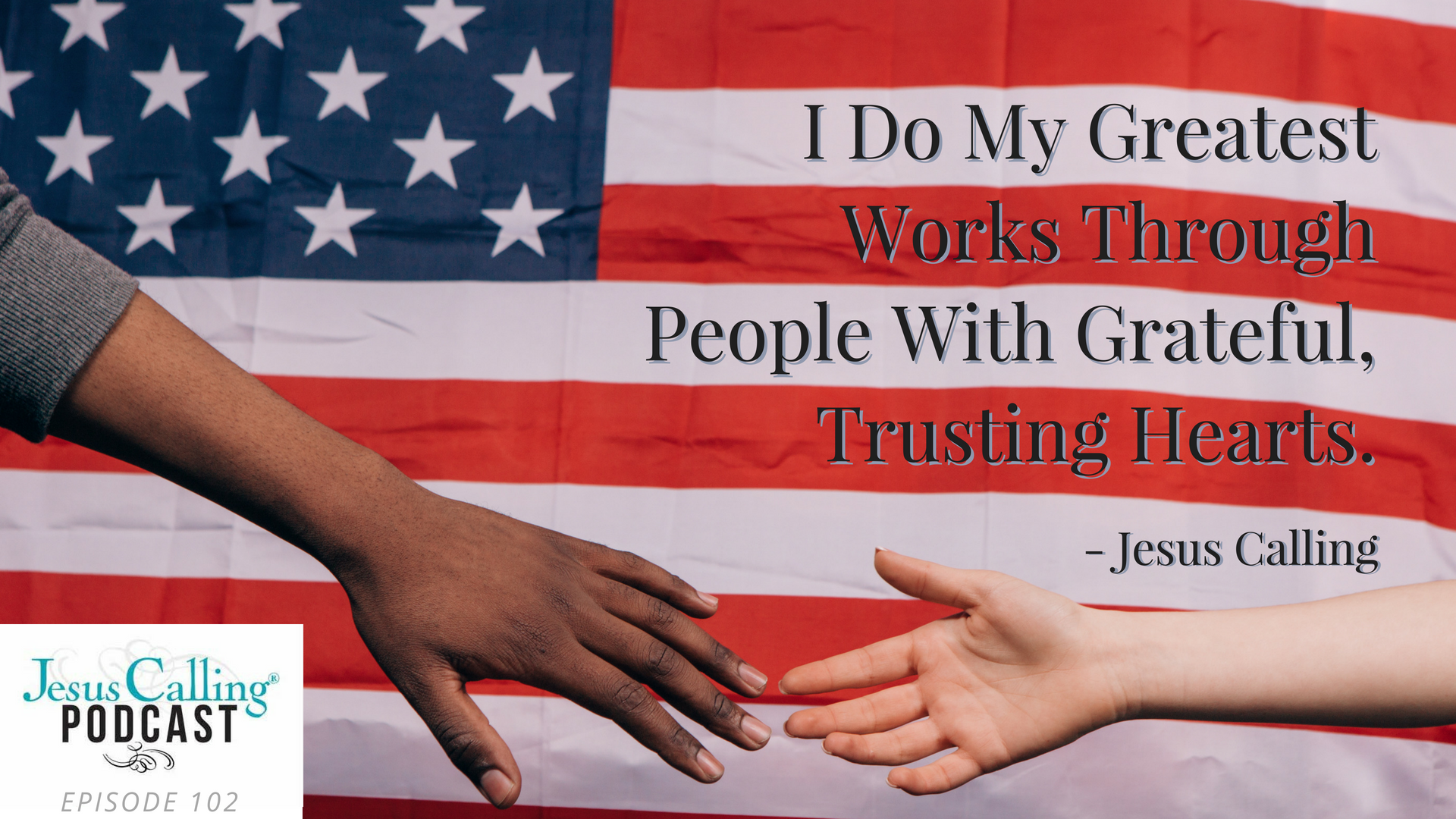
Description: It’s easy to find heroes in history books or on the screen. But we can also find heroes in smaller moments, quietly leading others through service. Today’s guests, country music star Neal McCoy and Air Force Veteran and Chick-fil-A Foundation Executive Director Rodney D. Bullard, talk to us about service and why they feel it’s important they give back to their communities, their country, and their God. Neal tells us about his family’s legacy of service and why he thinks getting involved in your local community can have a huge impact. And Rodney D. Bullard, author of the new book Heroes Wanted, shares powerful ways we can reach out to others to become everyday heroes and create a life of service.
Becoming An Everyday Hero: Neal McCoy & Rodney D. Bullard – Jesus Calling Episode #102
Narrator: Welcome to the Jesus Calling Podcast. Today’s guests talk to us about service and why they feel it’s important they give back to their communities, their country, and their God. First up, Neal McCoy is a award-winning country singer who has used his platform to unite his fans through patriotism and to donate his time and talent to charity. Neal tells us about his family’s legacy of service and why he thinks getting involved in your local community can have a huge impact.
Gratefulness For Our Freedom
Neal McCoy: Hey everybody, I’m Neal McCoy.
When I was young we were raised in church; we went to church all the time. My mom is from the Philippine Islands. She is one of the ones that helped put all the patriotism I have in my life.
She is also the one that was hard on us kids to say “we’re going to church every Sunday. I mean, you’re going to go.” And being the youngest of three, I was always trying to use excuses like, “My leg hurts. I’ve got a headache,” and not go to the church in the morning.
But she had a tough upbringing from the Philippines. She was 13 years old when The Occupation, basically the Japanese, hit Manila about eight hours after they hit Pearl Harbor. They were trying to take over the world at one time. So Mom was about 13 years old when the Japanese took over the Philippines took Manila, where she’s from. Martial law was going around, the Japanese are just killing people, and it’s really ugly over there. At the time, she’s the second oldest of eight kids. She, being the second oldest of 18 kids, understands the horrors of not living in a country with freedom. So my father met her when he was in the United States Army. He met my mom over in Philippines, ended up marrying her, came back home, and had us three kids.
She was one of the ones that always taught us at a young age, “You ought to be grateful of what you’ve got here. You don’t understand unless you’ve lived somewhere else. You don’t understand the rights and the freedoms you have and the religious freedoms—not just the everyday freedoms—religious freedoms you have to exercise.”
Again, when you’re young, it’s like, “Yeah, I hear you, Mom, that’s good. You’re doing good. I’m sure you are teaching us well.”
But then again, as you mature you get and start traveling a little more, you see some of the things that she was talking about. Then it all kind of comes around. So Mom, she was trying to teach from a young age, “Be thankful, be grateful.”
“Be thankful, be grateful.” – Neal McCoy
Again, at a young age it’s just like, “I am, I’m grateful I am—I appreciate it.”
The Significance of The Pledge
When it comes around—and now mom passed away about four months ago— she was one of the reasons that I was so patriotic because she understood. She had seen my USO work, and just kind of what I stood for, and what I turned into hopefully as a parent, a man and a grandparent.
“People want to, believe it or not, know that [God] is there and that they can call Him when they feel they need to.” – Neal McCoy
So what really made me start with with the Pledge of Allegiance thing that I’m on now that I’ve done, as of this morning, 902 days in a row was: she was starting to grow ill. So I wanted to show something that was going to honor her in a way. So I started it and I really—and this is before Facebook Live even came around—I just had a Facebook page. I never really exercised it. I was one of those guys you know like, “oh my gosh, I see the kids are doing this. I’m old school—I don’t have time for it.” I didn’t even know that it could be such a great tool to use.
So I woke up one morning I said to my wife, “All right. I’m gonna write the The Pledge of Allegiance on my page, just to see what will happen. Maybe nothing will happen.” And sure enough, people writing. “What’s that about? What’s the deal with that?” And so I just started writing.
And now I’d written probably five, six, seven days in a row and just would write the Pledge of Allegiance. Then a couple people started saying “Hey, I really appreciate that. That’s cool.”
And then and I said, “Well, you know if you like it, why don’t you write it back to me?” Because if you’re taking the time to write it, you’re saying it. And a lot of times if you say things out loud, they kind of sink in a little more. At least, that’s always been the way with me. Or if you take time to write it down, it’s just better than trying to remember it. So I started doing it and it garnered quite an audience. People were writing back, “Oh this is cool,” and they would take the time to write it it back to me.
Then when Facebook Live came around, I started going live with it. And I just said, “I’m going to be on here every morning saying the Pledge of Allegiance. I don’t have a set time. When I finish that day, I can look at what I’m going to do tomorrow and I’ll give you a time. And if I miss it by few minutes, I’ll just miss it.”
And when I started doing it, it just it was it was crazy. We were reaching a million and half people a day, and sometimes getting 100,000 to 200,000 people sharing it, viewing it a day.
I go somewhere now, my bus is wrapped with an American flag and it’s got the Pledge of Allegiance. That’s how much I am about it. And you’ll be surprised at all the comments and compliments you get from people around the world at shows now. Now, people are coming to our shows, sometimes just in hopes that I’ll say the Pledge of Allegiance from stage, they are that into it.
And those are people that love this country that may not have had a way to express it, but now they did. Now they can say the Pledge of Allegiance with me everyday, and it’s a big deal, and it’s just grown to what it is. Now I guess my nickname is “pledge.” People have nicknamed me “pledge.” And they send me, I’ve got so many Pledge of Allegiances from people that have carved in wood and concrete, and plaques and stuff they’ve sent me. And it’s really just touched a nerve in people.
I was never in the military formally but my my grandfather was in world. And they called it the “World War” at the time because there wasn’t a World War II. My father was in the United States Army. He even met my mom, which one more thing I’m grateful for.
I never served, but I was always patriotic in my belief. So when the towers fell in ’01 in New York, everybody was saying, “What can I do? How can I help?” So a lot of people were donating blood. Some people sent donations. A lot of people were left saying, “I wish there was something I could do.”
Wayne Newton reached out to me when the towers fell in September. In the first of November, he knew about my patriotism, my USO work. He was the same guy—he had done some USO work stuff too. He reached out to me and said, “We’re putting together a group to go do a USO tour. What do you think about going?” I said, “Gosh that’d be great!” I was so excited that Wayne had even called me, or even knew who I was.
So I went on that USO tour and we got back—that was at Thanksgiving 2001. We were back about two weeks, and he calls me and says “Is this a landline or cell phone?
I said, “It’s my cell phone.”
He said, “Go to a landline.”
I call him and he says, “We’re going to go to the sandbox. I can’t say that much. We’re going in the sandbox at Christmas. Would you like to go with me? I’ve invited you and a couple other people—that’s all I want to take. It’s a small thing. We need to get in and out.”
I said, “Well, this’ll be when I actually check with my wife.”
So I told her and she said “So basically, you’re going to Afghanistan.”
And I said “Yeah, I think so. He called it ‘the sandbox.’ He never said ‘Afghanistan.’ But I tend to think, yeah, that’s where we’re going.”
And so that was my first time really flying into anything like that, and it changed my life. We flew into Afghanistan into Kandahar Airport. We went to two camps. The first base our Marines established when they started the invasion into Afghanistan after the towers fell. We went in to see those kids, and I won’t go into the whole thing, but we were there. And they were coming out of foxholes and everything to come into just a thing where we strung from lightbulbs where we could just even see them. They were coming in, and they’d been there for, some of them, 45 days, no shower, nothing, drinking bottled water. And they would take their goggles off and they were just covered in filth and dirt. And we got to give them a little bit of home.
And From that moment, I just said, “This is something I’ll continue to do the rest of my life.” So that that whole thing was created from the patriotism that my mom had established in us as a kid.
There are a lot of people that love God, that believe in God, but don’t want it forced down their throat, if you will. They kind of feel like, “I’m on my own relationship with Him.” A lot of people that have a close relationship with God, and it’s between them and God, their God.
So I think what Jesus Calling has done is, people want to, believe it or not, know that He is there and that they can call Him when they feel they need to. Once they feel that need, once they do call on Him, and realize that He is there, then they’re much more careful going back to Him and staying with Him. I mean that’s it. That’s it in a nutshell, kind of, to me.
So I think that’s where the book comes in. And that’s where that comfort comes in, that they know they can go and read parts of that book and relate. There’s a lot of that in there—almost everybody can find something they can relate to in there.
The East Texas Angel Network
I do a lot of shows. And when you have a record of success that people will call you in and it’s a paying gig for us—they book it, we go play it—we get there and find out it’s a benefit. Well, I got disappointed that people were coming up to me and saying “Hey, we appreciate you being here and helping these folks.”
And I would say “I’m so sorry. I’m here, I’m getting paid. And I don’t want you to think that I’m on the pretenses here.”
I went to a show in Tombstone, Arizona. And I said, “I’m going to make a conscious effort to find out what’s going on. And from now on, if I go there and somebody’s patting me on the back, I want to know what I’m helping with and what I’m doing.” So we were helping a little boy. They were trying to raise money. And after everything’s paid for, the money left goes to him. And he had bone marrow cancer. His name was Matthew Barney. I became friends with him, put him in one of my first successful videos on we had called “Wink.” It was a big hit for us. He was in the video.
I went home to my wife. She was pregnant with our son. And I said, “You know what? There’s a lot of people that are helping people. What can we do?”
And so we sat and we talked about it. And we said, “We’ll start a foundation. Because a lot of times when catastrophes happen, when somebody needs financial help, they wait until it happens, and then everybody gets together and tries raise money, and it’s almost too late. We’re going to raise money, put it into a foundation. So when a child needs it, it will be there already.”
The East Texas Angel Network is a foundation my wife and I started, coming September, 24 years ago to help children with life-threatening, life-challenge illnesses in our home area, our Northeast Texas area. We’ve done a lot of stuff for and continue to for Ronald McDonald Houses and St. Jude’s, and a lot of that stuff.
I think if more people got involved and help in their areas their communities their regions it would it would lighten the load on some of the national things.
As you get a little older, you kind of look around, you figure out life a little better, you understand God a little more. You understand the things that we should thank Him for and be grateful for. Then you get married, you have your kids and grandkids. Everything just kind of comes full circle to where, looking back, I understand what Mom was trying to do.
Narrator: If you’d like to learn more about Neal McCoy or follow along with his daily Pledge of Allegiance, visit nealmccoy.com.
Narrator: We’ll be back with the second half of our podcast after this brief message from Jesus Calling about Jesus Calling Stories of Faith.
Commercial: As a listener of the Jesus Calling Podcast, we hope you’ve enjoyed the stories of faith it is our honor to bring you each week. Now, we are bringing our stories to you on video, with the guests you’ve come to know and love from the podcast. Not only will we feature stories from well-known people like Reba McEntire, Max Lucado, Lysa TerKeurst, and others, but we’ll also bring you real life stories of Jesus Calling readers, just like yourselves, who share their stories of hope, restoration, and inspiration. Join us twice monthly on the Jesus Calling Facebook page where we’ll bring you Jesus Calling Stories of Faith on Sunday nights. Also, so you don’t ever miss a new story, be sure to subscribe to the Jesus Calling YouTube page by going to JesusCalling.com/YouTube where you can watch all of our videos.
Rodney D. Bullard is Looking For Heroes
Narrator: Our next guest is Air Force Veteran Rodney D. Bullard, who is now Executive Director of the Chick-fil-A Foundation. Rodney is a graduate of the Air Force Academy, Duke Law, and Harvard Business School. His new book, Heroes Wanted: Why the World Needs You to Live Your Heart Out, released earlier this year. Today, Rodney shares powerful ways we can reach out to others to become everyday heroes and create a life of service.
Rodney Bullard: My name is Rodney Bullard, and I have the honor of working with Chick-fil-A and the Chick-fil-A Foundation as Executive Director of the Chick-fil-A Foundation, and Vice President of Community Affairs at Chick-fil-A, Inc.
And that has been an absolute labor of love, to work with Dan Cathy and the Cathy family and the staff at Chick-fil-A, who all have a sense of higher purpose and a sense of, We are there to be more than just a restaurant. We’re there to be a place of inspiration and giving. And so I’m happy about that and very pleased about the work that we’ve been able to accomplish through the Chick-fil-A Foundation.
“We are there to be more than just a restaurant. We’re there to be a place of inspiration and giving.” – Rodney Bullard
But we also understand that there’s income, and then there’s the opportunity for influence off of the income. And the Chick-fil-A Foundation is purposed on ensuring that every child grows up to be everything that they were created to be. And in order to do that, we have to create strong communities where children feel safe, where education is thriving and children get exposed, and that they feel that they can do anything, and they see opportunities and people coming into those communities who give them hope and inspiration.
My First Heroes
I grew up in Atlanta, Georgia—right outside of Atlanta, Georgia, in Decatur, Georgia. And my father was a Baptist minister, and my mother an educator. They were my early role models and my early heroes, quite frankly. My father, in particular, taught me a lot about nurturing. My mother, in particular, taught me a lot about resilience and not giving up or giving in, and the importance of education. My mother always stressed education, and she gave me the opportunity to have a great education.
My first recollection of a hero, outside of my own family members, was when I was in first grade. I had a difficult time reading in first grade. I was going to one particular school, a private school here in Atlanta, and my mother received a call from that school. And they told her that I had a difficult time reading and that they wanted to place me in a developmentally slower class.
And my mother, an educator herself, moved me to a new school.
The new school involved and included a teacher by the name of Mrs. Adams. And Mrs. Adams was my new first grade teacher. It was the middle of the school year at that point. She also noticed that I had a difficult time reading. And at the end of the school year, she called my mother and she said, “Hey, Rodney has had a difficult time reading over this year. But I see potential in him, and I would like to help tutor him over the summer.” And she did that. She tutored me over the summer, and she taught me to read phonetically. And because of that, I was reading two grade levels ahead of my peers at the end of the summer.
And so I found somebody who took of their summer, took up their time to do something extra, beneficial, extraordinary for me. You know, I still am the return on that investment and many others. Many other people along the way invested in me: many educators, many mentors, many business mentors and educators etc. invested in me.
We all have heroes. I think we all can recount somebody who, whether it was an educator or whether it was a family member or someone else, took the time to invest in us. And I think it’s important for us to remember those heroes, that we’re inspired by their dedication and their action.
Discipline & Leadership at The Air Force Academy
I went off to the Air Force Academy after high school, and I went to the Air Force Academy for three reasons: they had a great football team, and I was a football player in college. And they had a mock trial team, and I aspired to be an attorney. And there was a leadership institution, and I always admired leadership, particularly growing up in Atlanta, the cradle of the civil rights movement, and just seeing the leadership of selfless leadership of Dr. King and others. And so leadership has always been important to me.
My parents were not, um, were not disciplined in the way of the Air Force Academy or the Air Force. And so it was, in some ways, a shock. But in some ways, it was refreshing because of structure. There was an expectation of greatness that I appreciated that the Air Force Academy provided. I think that we rise to the occasion based off of the expectations that are placed on us. And so I think about that when I think about the personal expectations that I place on myself, as well as the organizational expectations that are placed on me externally.
And so it’s key to me, as I look back at the Air Force Academy, that leadership makes everything happen. And I have come to my own conclusion that leadership is about solving hard problems. Anybody can solve easy problems, but it’s really about solving hard problems at its greatest, and that we should aspire to try to solve hard problems. Authentic, real problems.
And that means helping somebody else. Those problems really are not as significant. And they have, not a hollow quality, but they don’t have the same resonance if those problems are just for ourselves. And that’s not to say we don’t have to solve our own problems. We do, without question. But we also have to look beyond ourselves as we solve our own problems to help others. And I think we’ll find satisfaction as we look to help our neighbors and we look across division and divide to do so.
And so there is opportunity in our country, particularly at this time, to cross division and divide to understand that we all have the same humanity. We all have the same problems, and the same desires, and the same aspirations. And because of that, we can empathetically help one another, regardless of any difference.
Lincoln, Churchill, and Leading In Difficulty
So when I was a young child, I really had a curiosity and interest in history, and I still love history. I’m particularly struck by Abraham Lincoln, and I’m particularly struck by Winston Churchill.
Lincoln’s Cabinet was successful because it had rivals. It had people who were on different sides of issues and sometimes different personalities that conflicted. But at the end of the day, Harvard has done studies on teams that are more diverse. Sometimes it feel like it’s tougher, but they get more done. They accomplish more because of their different perspectives, and they’re able to bring those viewpoints together to get something greater than themselves and the whole or the individual parts.
Winston Churchill also was such a charismatic and dynamic leader in a time of trouble for his country. And so I think that both of those corollaries relate and resonate with me that strength in trouble, strength and difficulty is such a hallmark of a leader because there will be trouble there will be difficulty.
Rodney’s Book, Heroes Wanted
And it really kind of speaks to the heart of the book that I’ve written, Heroes Wanted, that we all have a hero in us. We don’t have to be the leader of a country, but we all will see difficulty. We all will encounter people who have difficulty in their lives. There is an opportunity when we encounter that difficulty to help somebody else, to ameliorate those hurts and those wrongs. We all have that ability to do that in very simple and kind ways.
The book has nine different chapters; all of them begin with “C.” Two of the chapters are “Calling” and “Conviction.”
I particularly call attention to “Conviction.” Our hearts are convicted when we take the time to notice that which is around you. In fact, I call it “that which is when you’re within your three feet,” that we can’t change the world, but we can impact that three feet around us. And we have to take the intentional step to notice that which is within our three feet.
“Our hearts are convicted when we take the time to notice that which is around you.” – Rodney Bullard
And when we see a problem, particularly a problem that naturally convicts us—and I think all of us do see issues that convict us, that tear at our heart and that we say, “We know that’s not right. We know something else, something needs to be done about that—” that we don’t wait for somebody else to do something about it, that we do something about it. And that we answer that which is now becoming a calling. We are convicted in our heart, and then we answer that calling to do something about it.
And I also talk in the book, finally, that you don’t have to be able to solve all the problems. In fact, I talk in the book about “the only.” And oftentimes we say, “Well, I only can do this,” or, “I only can do this.” But turn that on its head and say instead, “I only have this time, and I have this skill to give in that time, and only I have this skill to give. And it may not be a lot of time, but I’m going to give that time because only I can get this skill in that time.” And I think that’s important for us to see ourselves as giving whatever drop we have in the bucket because everybody has to give a drop to fill the bucket.
There are different types of heroes. There are “Big-H” Heroes. There are “Little-H”heroes. They are different types of heroes. Also, there’s an element of inspiration in being a hero. I definitely have been inspired by athletes and their sacrifice and what they’ve done on a court or field with a ball or racket. I have definitely been inspired by people who give up small acts of kindness and people who give in moments of insignificance or in seemingly insignificant times.
I think that we all have a hero in us. What does concern me, and did concern me even as I was writing this book and using the term “hero,” that it’s such an overused term. It has a little bit of triteness to it. But really the purpose of the book is to turn its head on that triteness, that we don’t have to see heroes as is this big, glamorous thing and heroes as those who have given the ultimate sacrifice only. Those are heroes, without question. But heroism also is an everyday act. And there is an everyday opportunity to be someone else’s hero. And it can be speaking to somebody who thousands of people pass by and never speak to, but you speak to them and you make their day. And you were the hero in that moment for that day.
“Heroism also is an everyday act.” – Rodney Bullard
Remembering Who God is with Jesus Calling
I think we all have fears, and I think that we ebb and flow in our confidence, if we’re all honest about that. And that confidence may ebb and flow when we try something new. That confidence may ebb and flow when crisis comes or when, actually, when good things happen. Sometimes when you’re riding a wave you say, “I can’t believe that I’m here. I can’t believe I’m riding this wave. And when is it going to crash?”
I think that is healthy for us to recognize that. I think it’s healthy for us to embrace it. But I also think it’s healthy for us to have faith in ourselves and our faith from our own personal belief perspective and a higher order, that our lives a being orchestrated and that we don’t have to rely on our own strength so much. God does have us and that He will keep us and that we can make it with Him. And so I think that trust in fact actually brings to mind your your daily devotional, Jesus Calling.
You have a passage on January 4th that really struck me. And so on January 4th it says:
“I want you to learn a new habit. Try saying, ‘I trust you, Jesus,’ in response to whatever happens to you. If there is time, think about who I Am and all my Power and Glory; ponder also the depth and breadth of My Love for you.”
And so that’s an important passage. I know it’s a daily devotional, but it’s important for us to remember who He is, and that He does have us, and that He does keep us, and we can trust Him. We don’t have to trust ourselves, because if we’re just trusting ourselves, surely, we will recognize our own insignificance, and surely, we will become we would notice that we were walking on water and we shouldn’t be. And so I think that’s important.
“It’s important for us to remember who [God] is, and that He does have us, and that He does keep us, and we can trust Him.” – Rodney Bullard
Answering the Call to be an Everyday Hero
I haven’t been noted for changing communities. I think I’ve been noted for being a part of teams and for being a part of organizations and for being a part of groups of leaders that have been noted. And I think that’s an important distinction because it’s easy for us to think of ourselves as bigger than we are. It’s easier for us to think of ourselves as an anecdote or a hero. But really, I don’t think what we’re in need of is a Superman or superbeing or superhero. I think we’re in need of each one of us putting our shoulder to the rebuilding of the wall, and that we do that collectively and we do that together and we do that in community. And we do that with conviction and we do that because of a calling. And I think that if each one of us uses our own particular gifts, then we would answer our call to leadership. We’ll answer our call of community. And we’ll answer our call of heroism.
Narrator: You can find Rodney’s book Heroes Wanted on Amazon or anywhere books are sold.
Narrator: Next time on the Jesus Calling Podcast, we talk with author and speaker Kristin Fry, who has been ministering for almost twenty years. Kristin has a passion for helping others live the full lives God designed for them and talks to us about how we can find our genuine identities in Him.
KristIn Fry: I am here, and God has a purpose and a plan for my life that He has purposed and planned for only me to fulfill. Being married or not married isn’t going to affect any of that. So, I want to make the most of the life that I have been given. And I always say that to other women too: “Hey, you can do things that only you can do. You’ve been created on purpose for a purpose.”
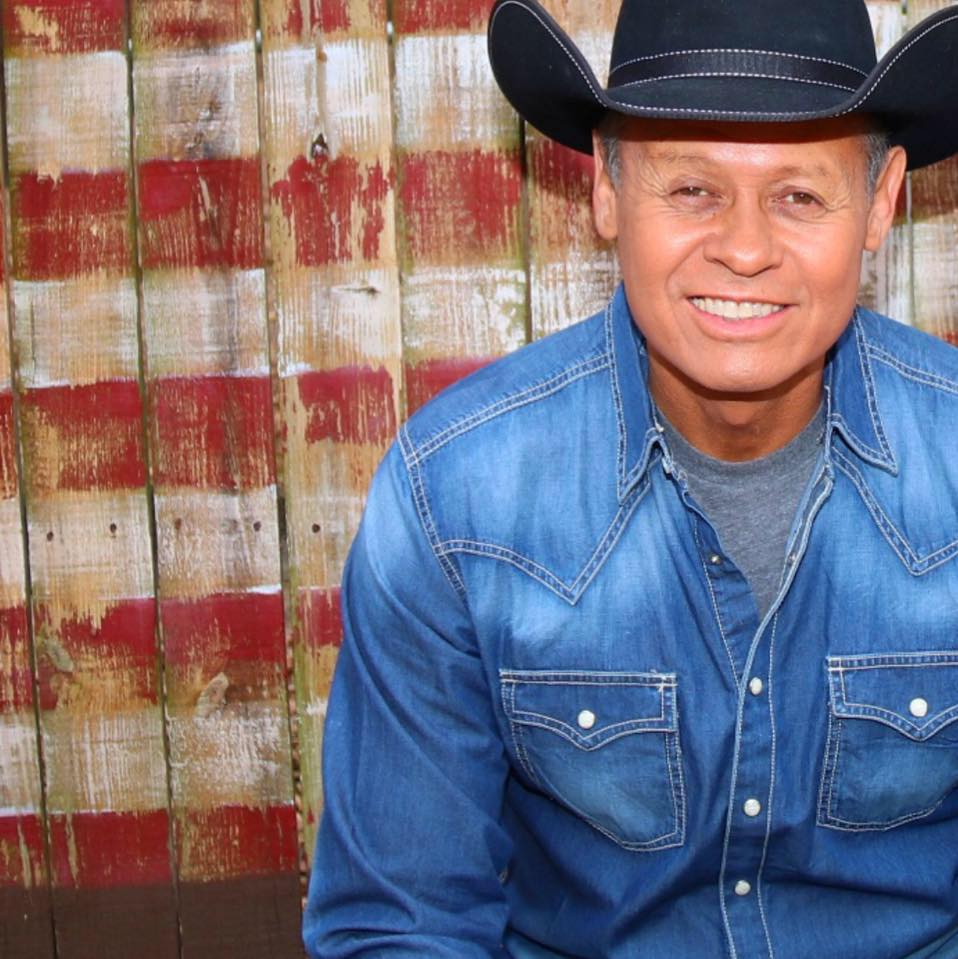
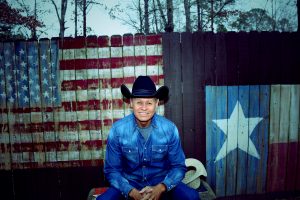
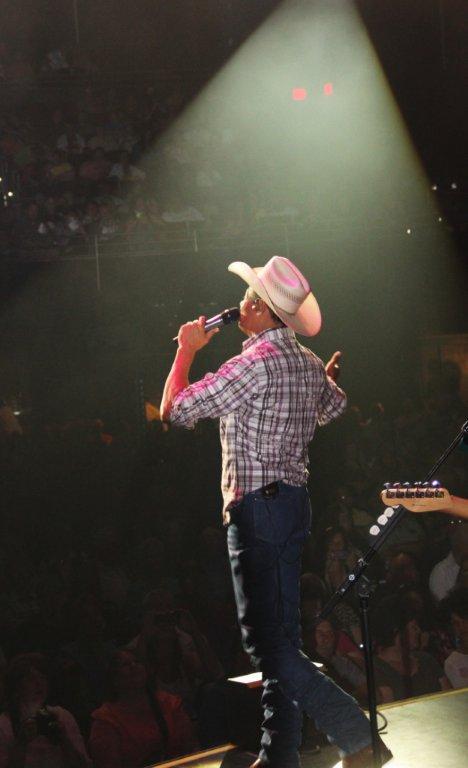
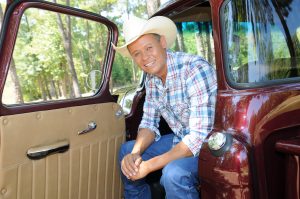
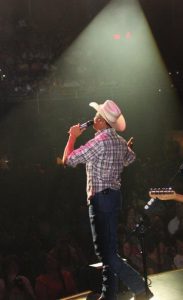
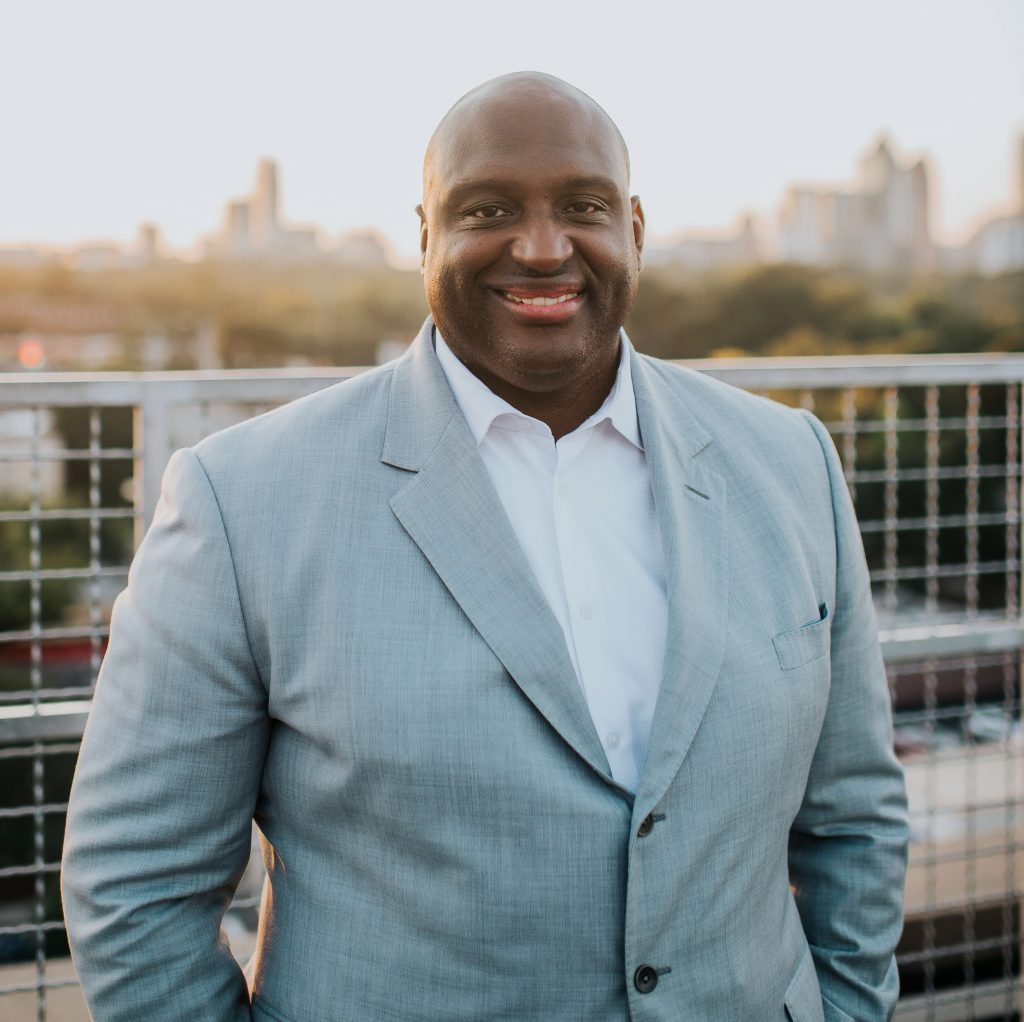
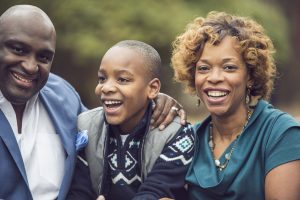
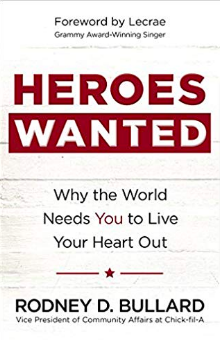
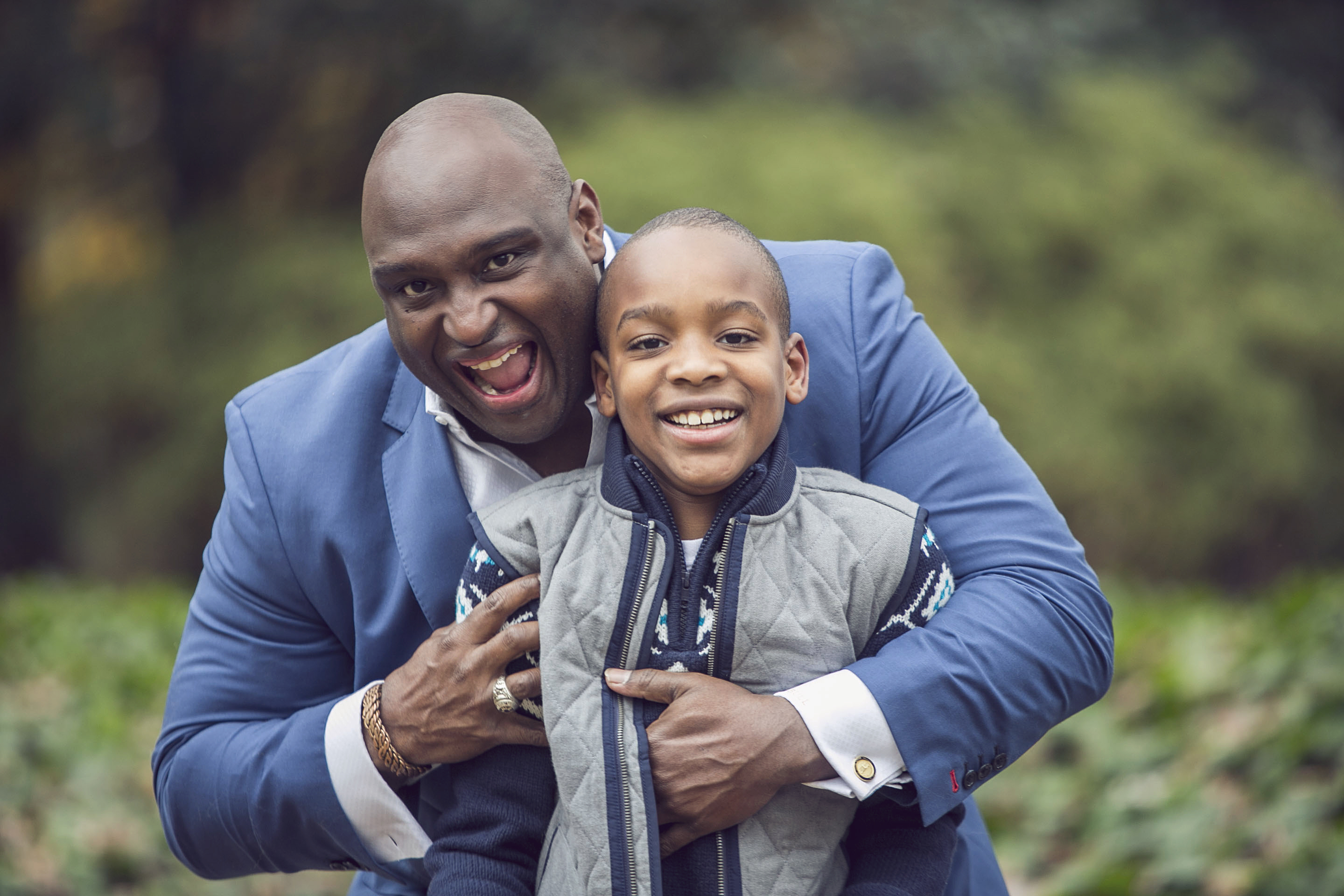


One thought on “Becoming An Everyday Hero: Neal McCoy & Rodney D. Bullard”
Comments are closed.